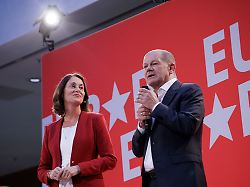2019 historically bad result
Barley should return to the EU Parliament with the SPD
September 25, 2023, 7:26 p.m
Despite the disappointing performance in the previous EU election, the SPD wants to go into the election campaign again with Barley as the top candidate. The party leadership praises the 54-year-old as a convinced European. This presents itself as a fighter against the attacks on democracy.
The SPD wants to go into the 2024 European elections again with Katarina Barley as the top candidate. The 54-year-old Vice President of the European Parliament was unanimously nominated by the party leadership. “You are a convinced European, a passionate European,” said party leader Lars Klingbeil about the SPD’s top woman in Brussels. “Europe has come under pressure in recent years,” he continued. There are attacks on European values by right-wing populists, right-wing extremists and sometimes even conservatives. Barley himself warned against a move to the right. The SPD is always firmly on the side of democracy, she assured.
Chancellor Olaf Scholz emphasized: “Europe is important for peace and security.” That is why it is so important that one can rely on the European institutions. That’s exactly what Barley stands for. This is the lawyer’s second top candidate; she also ran as German number one for the SPD in the 2019 European elections. At that time, the Social Democrats achieved their worst result ever with 15.8 percent.
Guardian of the rule of law
Barley has operated relatively quietly in Brussels and Strasbourg over the past four years. As Vice-President of the European Parliament, she is automatically a member of the Bureau, which decides on financial, organizational and administrative issues. In addition, she can be commissioned by Parliament Speaker Roberta Metsola to represent Parliament on official occasions.
Politically, the 54-year-old has advocated, among other things, decisive action against violations of the rule of law in the EU during her term in office. She is calling for a tough course against Hungarian Prime Minister Viktor Orban, who is accused of restricting media freedom in his country.
Barley recently criticized the CSU European politician and head of the Christian Democratic European party family, Manfred Weber, several times for his willingness to talk to right-wing politicians. Weber “consciously opened the flank to the right and makes no secret of it,” she recently told the “Augsburger Allgemeine”. After the European elections, the CSU politician wants to work with right-wing populists and those even further to the right.
Von der Leyen is still keeping a low profile
Before her career at the EU Parliament, Barley was Federal Minister of Justice, previously Family Minister and SPD General Secretary. For several years she worked as a research assistant at the Federal Constitutional Court. The mother of two has been a member of the SPD since 1994. However, she initially pursued a career as a lawyer until she entered the Bundestag in 2013. After that, her political career went quickly: Secretary General, Minister in several departments. She once described herself as the SPD’s all-purpose weapon. In 2019, she was the first in the federal government to give up a ministerial office for a top European candidate.
The SPD is not the first party to stand for the European elections: Defense expert Marie-Agnes Strack-Zimmermann is running for the FDP. Party leader Martin Schirdewan, currently co-group leader in the European Parliament, wants to get involved again for the Left. In addition, the party leadership has suggested refugee activist Carola Rackete, among others, for the top places on the list.
EU Commission President Ursula von der Leyen, on the other hand, has not yet commented on whether she is seeking another term in office after the European elections. In order to be able to remain at the head of the EU Commission for another five years, the CDU politician would, as things currently stand, have to be nominated as the top candidate of the European EVP party family. In addition to the German CDU and CSU, this includes the Austrian ÖVP, the Italian Forza Italia and Spain’s conservative People’s Party PP.
